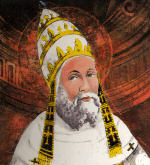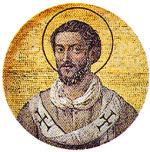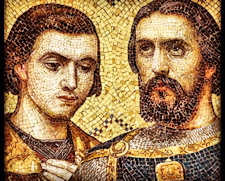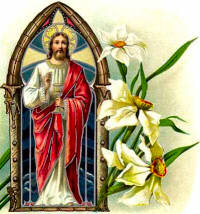Easter: April 22nd
Wednesday of the Second Week of Easter
Other Commemorations: St. Soter, Pope (RM); St. Caius, Pope (RM); St. Epipodius, Martyr (RM)
» Enjoy our Liturgical Seasons series of e-books!
According to the 1962 Missal of St. John XXIII the Extraordinary Form of the Roman Rite, today is the feast of Sts. Soter and Caius. Soter succeeded Anicetus as Pope in 166, and died a martyr in 175, under Emperor Marcus Aurelius. Caius, whose relics are preserved at the sanctuary of St. Silvester in Rome, governed the Church a century later and died on April 22, 296. The popes of the first centuries suffered the heavy anxiety of the persecutions which continually threatened their flocks; the pontificate of Caius, however, was marked by a long period of peace, some ten years before the terrible persecution under Diocletian.
Historically today is the feast of Sts. Epipodius and Alexander, two Christian young men of Lyons—both unmarried and of good position. During the fierce persecution of Marcus Aurelius in that city (178), they were arrested, imprisoned, and finally brought before the governor. Their ready acknowledgment of being Christians elicited astonishment of the governor who was well aware of the fierce tortures and executions that had already been meted out to Christians.
Pope St. Soter
 St. Soter, the successor to Pope Anicetus, died a martyr's death in 175. He was noted for his kindness to certain Greeks who had been condemned to the mines because of their faith in Christ. When he ascended the chair of Peter he forbade consecrated virgins to touch the sacred vessels and palls, or to carry censers in church. He also obliged the faithful, except those in mortal sin, to receive holy Communion on Maundy Thursday. Soter is the author of a letter to the Corinthians.
St. Soter, the successor to Pope Anicetus, died a martyr's death in 175. He was noted for his kindness to certain Greeks who had been condemned to the mines because of their faith in Christ. When he ascended the chair of Peter he forbade consecrated virgins to touch the sacred vessels and palls, or to carry censers in church. He also obliged the faithful, except those in mortal sin, to receive holy Communion on Maundy Thursday. Soter is the author of a letter to the Corinthians.
Highlights and Things to Do:
- Read more about St. Soter:
- St. Soter is traditionally venerated as a martyr, but no historical information exists today. He was originally buried in the Callistus cemetery in Rome, Italy.
Pope St. Caius
 St. Caius (pope from 283 to 296) was closely related to the Emperor Diocletian. So that he might live to serve the faithful, he remained in concealment a long time and would not leave Rome. Ordinarily it was in the catacombs that he hid, and there he celebrated the holy mysteries and instructed many pagans. It was Pope Caius who decreed (according to the false Decretals) that the following steps must precede consecration to the episcopate: porter, lector, exorcist, acolyte, subdeacon, deacon, and priest. He died a natural death and was buried in the catacomb of Callistus on April 22. St. Susanna was his niece. Pope Urban VIII revived his memory in Rome by restoring his church, naming him as its patron saint, raising it to the rank of a station, and enriching it with the saint's relics.
St. Caius (pope from 283 to 296) was closely related to the Emperor Diocletian. So that he might live to serve the faithful, he remained in concealment a long time and would not leave Rome. Ordinarily it was in the catacombs that he hid, and there he celebrated the holy mysteries and instructed many pagans. It was Pope Caius who decreed (according to the false Decretals) that the following steps must precede consecration to the episcopate: porter, lector, exorcist, acolyte, subdeacon, deacon, and priest. He died a natural death and was buried in the catacomb of Callistus on April 22. St. Susanna was his niece. Pope Urban VIII revived his memory in Rome by restoring his church, naming him as its patron saint, raising it to the rank of a station, and enriching it with the saint's relics.
Symbols and Representation: pope with Saint Nereus
Highlights and Things to Do:
- Read more about St. Caius:
- St. Caius' relics have been translated from the crypt of St. Eusebius in the Cemetery of Callixtus to San Silvestre in Capite, then to another church, then to the private chapel of the Barberini princes in Sant'Andrea della Valle.
St. Epipodius
 Born during the 2nd century, St. Epipodius and St. Alexander of Lyon became best friends while growing up and attending school together. They were both raised Christian and shared a similar passion for their faith. It was not long until these two young men were put to the test during the reign of Marcus Aurelius.
Born during the 2nd century, St. Epipodius and St. Alexander of Lyon became best friends while growing up and attending school together. They were both raised Christian and shared a similar passion for their faith. It was not long until these two young men were put to the test during the reign of Marcus Aurelius.
At the time there was a great persecution underway, especially in their own city of Lyons. Epipodius and Alexander kept secret about their faith and sought to hide from the local authorities. A servant betrayed Epipodius and Alexander and reported them to the governor. They were to be arrested for their Christian faith but they heard about the order and immediately fled the city. They escaped to a nearby town and found refuge in the house of a Christian widow. The two friends were concealed for a time and remained in hiding.
However, they were eventually discovered and immediately brought before the governor. The Roman official sought to torture Epipodius and Alexander in hopes of getting them to renounce their Christian faith. He separated the two and first questioned Epipodius, who replied, “I shall not suffer myself to be prevailed upon by this pretended and cruel compassion. Are you so ignorant as not to know that man is composed of two substances, a soul and a body? With us the soul commands and the body obeys. The abominations you are guilty of in honor of your pretended deities, afford pleasure to the body but kill the soul. We are engaged in a war against the body for the advantage of the soul. You, after having defiled yourselves with pleasures like brute beasts, find nothing at last but a sorrowful death; whereas we, when you destroy us, enter into eternal life.”
Outraged by his response, the governor had him stretched on a rack and severely tortured before cutting off his head.
The governor then brought in Alexander and put him to the test, explaining how his dear friend was tortured. Alexander replied, “I thank my God that the mention of the deaths of my brethren only confirms my desire of imitating their example. Do you imagine that their souls have died with their bodies? No; they have gone to the enjoyment of heaven. You are deceived, thinking that you can extinguish the Christian faith, which has been so established by God, that it is propagated by the death of the faithful. Those whom you believe to have killed are now in the enjoyment of heaven, which they shall continue to enjoy for all eternity; while, on the contrary, you and the objects of your adoration shall be cast into the fire of hell, to suffer for all eternity. I am a Christian, like my brother Epipodius, who is now reigning in heaven. Do therefore, to my body as it pleases you; for my soul shall be received by that God who created it.”
Alexander was crucified after being tortured and died immediately on the cross.
Epipodius and Alexander are known as the patron saints of bachelors, victims of betrayal, and victims of torture. Their steadfast example should give us courage to follow Christ to whatever end, even if that means betrayal and suffering. In the end, we must safeguard our soul above all else and not betray the God who gave up his own life so that we may live eternally.
—Excerpted from Aleteia
Patronage: bachelors; betrayal victims; torture victims
Highlights and Things to Do:
- Read more about Sts. Epipodius and Alexander at Bartleby.com
- Wikipedia
- Catholicsaints.info








